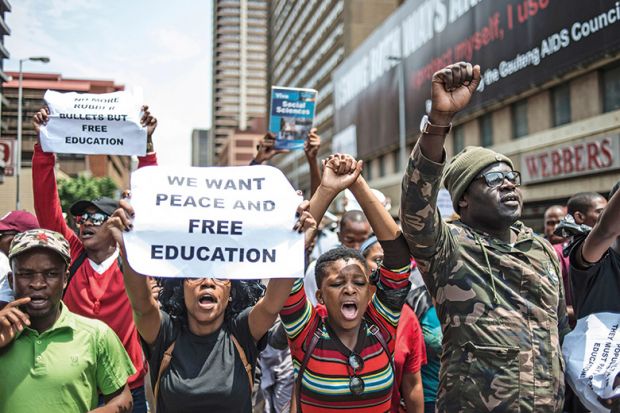The South African government has appointed an administrator to take over the running of its student financial aid scheme after the previous chair resigned, citing the “extreme strain” of the introduction of free university tuition in the country.
Sizwe Nxasana stepped down earlier this month after the National Students’ Financial Aid Scheme faced difficulty in making payments to the large number of undergraduates who became eligible for support when former president Jacob Zuma announced in December that the government would fully subsidise higher education for about 90 per cent of learners.
The organisation was poised to postpone the opening of applications for students starting courses in 2019 because a backlog in disbursing aid due in 2017 and 2018 had not been cleared, local media reported.
On 17 August, higher education minister Naledi Pandor announced that Randall Carollissen, group executive of revenue planning, analysis and reporting at the South African Revenue Service, would take over the governance, management and administration of NSFAS.
“The immediate focus for the administrator will be to ensure the effective closeout of the 2017 and 2018 student funding decisions and disbursements, as well as to urgently finalise plans for the 2019 funding cycle,” the Department for Higher Education and Training said in a statement.
The department said that Ms Pandor had urged Dr Carollissen to prepare for the opening of 2019 applications in September 2018, despite the fact that the backlog has still not yet cleared.
Meanwhile, it has emerged that damage caused by the Fees Must Fall protests that led to the abolition of fees for most students has cost South African universities R786 million (£42.5 million) in the past three years.
The hardest-hit institution was North-West University, which sustained R198 million in arson damage at its Mafikeng campus, while the University of Johannesburg sustained fire and vandalism damage worth R144 million, according to figures released by Ms Pandor in response to parliamentary questions from shadow higher education minister, Belinda Bozzoli.
Professor Bozzoli said that “this is not even the full cost of this period, as universities and colleges have also had to bear the costs of extra security, and repeat classes and exams, while many students have lost considerable study time as a result of long closures of their campuses”.




